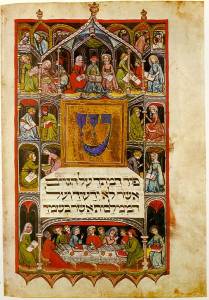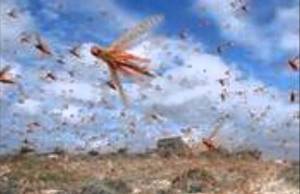Not only must we thank God for all the kindness he bestows upon us, but we should also search for the hidden layers of Divine goodness, as taught in the Haggadah.
By Rabbi Ari Enkin, Rabbinic Director, United with Israel
On the first night of Passover (and again on the second night, for those who do not yet live in Israel), we read from a special book called the Haggadah, which contains the order (seder, in Hebrew) of the service for this very special evening. It is full of history, stories, rituals, songs and more.
One of the readings in the Haggadah is the teaching of Rabbi Yossi and his colleagues. Based on a unique interpretation of a number of verses, Rabbi Yossi came to the conclusion that if the Egyptians were struck with 10 plagues in Egypt (just as the Torah says they were), then it’s reasonable to suggest that at the Red Sea they were struck with FIFTY plagues.

Illuminated Haggadah, 14th century (Wikipedia)
Rabbi Eliezer likes Rabbi Yossi’s thinking and suggests something similar, but comes to a different conclusion. He says that each plague in Egypt was actually four plagues each (totaling 40 in Egypt), and therefore, following Rabbi Yossi’s math, there were TWO HUNDRED plagues at the Red Sea.
Finally, Rabbi Akiva also subscribes to this thinking, and says that each plague in Egypt was actually five plagues (totaling 50), making the Red Sea a TWO-HUNDRED-AND-FIFTY plague experience!
This form of teaching and interpretation is known as drush. The teachings of these rabbis are not found in the text of the Torah itself, but rather, the rabbis came to these conclusions through deduction, poetic license and tradition. It doesn’t matter which rabbi is right. What is essential is the message that God was doing even more for us than we had realized.
The question is asked: Why are these rabbis’ mathematical interpretations included in the Haggadah at all? Why do we need these interpretations? As anyone familiar with the Haggadah can see, there is already plenty of serious Exodus material in the Haggadah, perhaps rendering these mathematical interpretations superfluous.
‘Plagues Within the Plagues’
It is explained that although this teaching is not essential for understanding the Exodus story, it is strategically positioned and leads us into the next unit of the Haggadah, which says, literally, “See how many great things did God do for us!” And with this statement, we then move into the beloved song of Dayeinu, in which we praise God for all the seemingly small miracles that He did for us, most of which would likely not be noticed had this song not been written.

The eighth plague: locusts (Youtube)
As such, the “plagues within the plagues” teaching of Rabbi Yossi and the rabbis is indeed significant. Although there were only 10 official plagues in Egypt, one who has more spiritual sensitivity would be able to sub-divide each plague into more than one, thereby giving us the inflated plague counts mentioned above. The Plague of Blood may have been one official plague, but think about the other plagues and miracles that would have come along with it. For example, when the Egyptians were unable to drink the water, they probably became sick and weak, rendering the Jewish slaves’ workload a little easier. We are also told that the Jews made money during this plague because the Egyptians were forced to buy water from the Jews, who were not subject to the plague. Plagues within plagues, miracles within miracles!
As such, the teaching of these rabbis is relevant not only to the Haggadah, but is essential for our lives each and every day. Like these rabbis, we should endeavor to look for all the good that God does for us, and not merely recognize and thank Him for it, but also to uncover the added layers of Divine love and providence.


Send Passover Packages to Needy Israeli Soldiers - Bring Them Joy!
We are honored to thank the young men and women of the IDF who risk their lives every day to protect the citizens of Israel. Since October 7th, soldiers have been on the battlefield for months - many are hoping to come home for Passover.
Join us in sending Passover food packages (and personal notes) to Israeli soldiers and their families.
Many soldiers spend the Passover holiday with needy families back home. The soldiers greatly appreciate your love and concern. Bring them Passover joy!
CLICK HERE TO SEND YOUR PACKAGE AND NOTE TO ISRAELI SOLDIERS!




